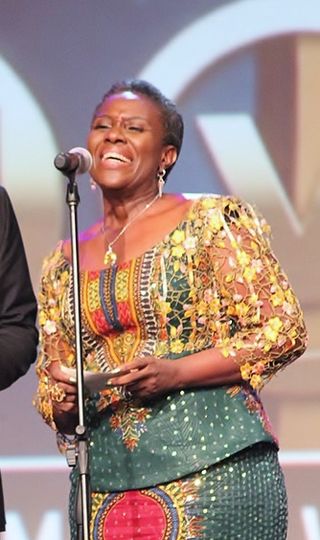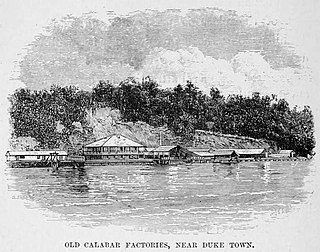Related Research Articles

Southern Nigeria was a British protectorate in the coastal areas of modern-day Nigeria formed in 1900 from the union of the Niger Coast Protectorate with territories chartered by the Royal Niger Company below Lokoja on the Niger River.

Calabar is the capital city of Cross River State, Nigeria. It was originally named Akwa Akpa, in the Efik language. The city is adjacent to the Calabar and Great Kwa rivers and creeks of the Cross River.

Samuel Crowther, was a Yoruba linguist, clergyman, and the first African Anglican bishop of West Africa. Born in Osogun, he and his family were captured by slave raiders when he was about twelve years old. This took place during the Yoruba civil wars, notably the Owu wars of 1821–1829, where his village Osogun was ransacked. Ajayi was later on resold to Portuguese slave dealers, where he was put on board to be transported to the New World through the Atlantic.

The Eastern Region was an administrative region in Nigeria, dating back originally from the division of the colony Southern Nigeria in 1954. Its first capital was Calabar. The capital was later moved to Enugu and the second capital was Umuahia. The region was officially divided in 1967 into three new states, the East-Central State, Rivers State and South-Eastern State. East-Central State had its capital at Enugu, which is now part of Enugu State.

Colonial Nigeria was ruled by the British Empire from the mid-nineteenth century until 1960 when Nigeria achieved independence. British influence in the region began with the prohibition of slave trade to British subjects in 1807. Britain annexed Lagos in 1861 and established the Oil River Protectorate in 1884. British influence in the Niger area increased gradually over the 19th century, but Britain did not effectively occupy the area until 1885. Other European powers acknowledged Britain's dominance over the area in the 1885 Berlin Conference.
Richard Beale Blaize was a Nigerian-Sierra Leonean businessman, newspaper publisher, financier, and black nationalist of Sierra Leonean and Nigerian heritage.
Chief Theophilus Adebayo DohertyListen was a Nigerian businessman and politician.

Joke Silva(listen)MFR is a Nigerian actress, director, and businesswoman.

The Kalabari Kingdom, also called Elem Kalabari, is the independent traditional state of the Kalabari people, an Ijaw ethnic group, in the Niger River Delta. It is recognized as a traditional state in what is now Rivers State, Nigeria.

Badagry, also spelled Badagri, is a coastal town and Local Government Area (LGA) in Lagos State, Nigeria. It is quite close to the city of Lagos, and located on the north bank of Porto Novo Creek, an inland waterway that connects Lagos to the Beninese capital of Porto-Novo. The same route connects Lagos, Ilaro, and Porto-Novo, and shares a border with the Republic of Benin. As of the preliminary 2006 census results, the municipality had a population of 241,093.

The Badagry in Bariga, a suburb of Lagos in Lagos State, is the oldest secondary school in Nigeria, founded on 6 June 1859 by the Church Missionary Society. For decades it was the main source of African clergymen and administrators in the Lagos Colony.

Lagos Colony was a British colonial possession centred on the port of Lagos in what is now southern Nigeria. Lagos was annexed on 6 August 1861 under the threat of force by Commander Beddingfield of HMS Prometheus who was accompanied by the Acting British Consul, William McCoskry. Oba Dosunmu of Lagos resisted the cession for 11 days while facing the threat of violence on Lagos and its people, but capitulated and signed the Lagos Treaty of Cession. Lagos was declared a colony on 5 March 1862. By 1872, Lagos was a cosmopolitan trading center with a population over 60,000. In the aftermath of prolonged wars between the mainland Yoruba states, the colony established a protectorate over most of Yorubaland between 1890 and 1897. The protectorate was incorporated into the new Southern Nigeria Protectorate in February 1906, and Lagos became the capital of the Protectorate of Nigeria in January 1914. Since then, Lagos has grown to become the largest city in West Africa, with an estimated metropolitan population of over 9,000,000 as of 2011.

The Calabar River in Cross River State, Nigeria flows from the north past the city of Calabar, joining the larger Cross River about 8 kilometres (5.0 mi) to the south. The river at Calabar forms a natural harbor deep enough for vessels with a draft of 6 metres (20 ft).
The Calabar Free Trade Zone (CFTZ) is an area just north of the port of Calabar, Cross River State, Nigeria that is occupied by companies engaged in manufacturing, trading, provision of services and oil and gas related activities. These companies benefit from special taxation rules and duty-free imports.
Brazilians in Nigeria, Amaros or Agudas consist of the descendants of freed Afro-Brazilian slaves who left Brazil and settled in Nigeria. The term Brazilians in Nigeria can also otherwise refer to first generation expatriates from Brazil.

The Saro, or Nigerian Creoles of the 19th and early 20th centuries, were Africans that were emancipated and initially resettled in Freetown, Sierra Leone by the Royal Navy, which, with the West Africa Squadron, enforced the abolition of the international slave trade after the British Parliament passed the Slave Trade Act 1807. Those freedmen who migrated back to Nigeria from Sierra Leone, over several generations starting from the 1830s, became known locally as Saro(elided form of Sierra Leone, from the Yoruba sàró). Consequently, the Saro are culturally descended from Sierra Leone Creoles, with ancestral roots to the Yoruba people of Nigeria.

James Pinson Labulo Davies was a Nigerian businessman, merchant-sailor, naval officer, farmer, pioneer industrialist, statesman, and philanthropist who married Sara Forbes Bonetta in colonial Lagos.
Obi Asika is a Nigerian creative industries entrepreneur. He is known for his involvement in the growth of Nigeria's music industry, as the founder and CEO of Storm 360 - an indigenous music label. Storm 360 has spawned a lot of Nigerian entertainers including Naeto C, Ikechukwu, Sasha P, General Pype, L.O.S., Ms Jaie, Tosin Martins, and Yung 6ix.
The Ecclesiastical Province of Lagos is one of the 14 ecclesiastical provinces of the Church of Nigeria. It comprises 13 dioceses:

James Vivian Clinton, OBE was a Gold Coast-born Sierra Leonean journalist and expatriate to Nigeria who came from a Sierra Leone Creole family of West Indian, Liberated African, and European origins that moved freely between many parts of West Africa. Although he maintained strong connections to the Sierra Leone Creole community, he eventually settled in Calabar in Nigeria and was awarded an OBE in 1949.
References
- ↑ Walter H Wills, R J Barrett. The Anglo-African Who's who and Biographical Sketchbook, G. Routledge & sons, 1905. p 127.
- ↑ Tom G. Forrest. The Advance of African Capital: The Growth of Nigerian Private Enterprise, University of Virginia Press, 1994. p 14. ISBN 0-8139-1562-7.
- ↑ "Abimbola Silva embraced a preventive approach to medicine - Oyinsan". pmnewsnigeria.com. July 20, 2015. Retrieved May 17, 2022.